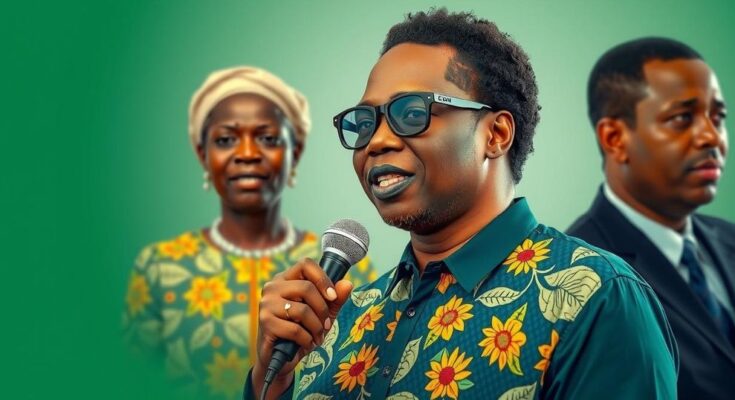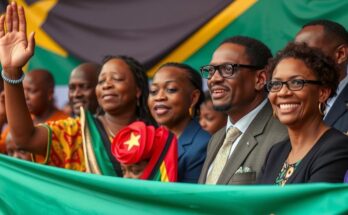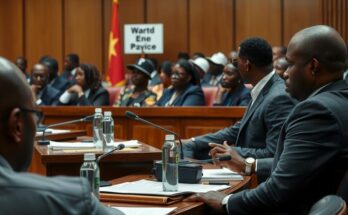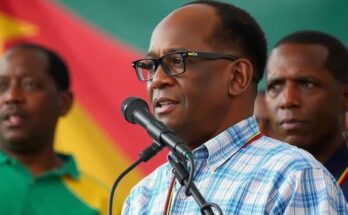Ghana is set to hold its presidential election on December 7, 2024, with Mahamudu Bawumia (NPP) and John Mahama (NDC) as the leading candidates. Key issues include rising inflation, economic distress, and environmental concerns over illegal gold mining. The election entails a dual contest for both presidency and parliamentary seats, with a chance of a runoff if no candidate secures a majority. Historical trends indicate closely contested elections in a peaceful political climate.
Ghana is poised for a significant transition in leadership, as the presidential election approaches on December 7, 2024. The main candidates are Mahamudu Bawumia, the current Vice President representing the New Patriotic Party (NPP), and John Mahama, a former President from the National Democratic Congress (NDC). With approximately 18.8 million registered voters participating in what will be the ninth general election in Ghana’s contemporary multiparty history, both men are vying for a pivotal role in shaping the nation’s future amid pressing economic challenges.
This election marks the close of Nana Akufo-Addo’s tenure, who was elected in 2016 and is completing his second and final term. On polling day, Ghanaians will engage in dual elections: selecting a president among twelve candidates and electing parliamentary representatives across 275 constituencies. Despite a diverse field, the contest predominantly hinges on the two frontrunners, both of whom have contrasting visions for Ghana’s recovery from its recent economic turmoil.
Mahamudu Bawumia, an accomplished economist educated at Oxford, aims to become the country’s first Muslim president after eight years as Vice President. He has encountered criticism for mismanagement during Ghana’s severe economic crisis, which has seen inflation soar. Conversely, John Mahama seeks a political revival after previously serving as President, facing the ongoing economic distress with promises of an “urgent reset” to rectify perceived failings from his earlier term.
The election is underscored by substantial economic concerns, particularly the rising cost of living, which peaked at an annual inflation rate of 54% in late 2022. Furthermore, the shadow of joblessness, particularly among the youth, looms large, exacerbating a trend of emigration among Ghanaians in search of better opportunities. As the NDC condemns the NPP’s fiscal record, the governing party defends its economic policies as a precursor to potential transformation.
Another critical issue at stake is the environmental degradation linked to illegal gold mining, locally referred to as “galamsey.” While both parties recognize the urgency of addressing this concern, their approaches diverge: the NPP wishes to strike a balance between economic interests and regulatory measures, while the NDC advocates for stricter controls and limits on new mining licenses.
In terms of electoral procedures, a candidate must secure over half of the votes to win outright; otherwise, a runoff election will ensue featuring the top two candidates. With robust historical precedents of close and civilized elections since the reinstatement of multiparty democracy in Ghana, including very narrow margins in outcomes, the electoral commission is expected to announce results by December 10, 2024.
Ghana has a storied history of peaceful transitions of power within its multiparty political framework since the early 1990s. The upcoming election is significant for both the social and economic landscapes, as the country grapples with inflation and unemployment amidst its political narrative. The leading candidates, Mahamudu Bawumia and John Mahama, represent divergent ideological stances on economic governance and environmental policy, setting the stage for a compelling electoral battle characterized by the urgency of addressing systemic poverty and sustainable resource management.
As Ghana approaches its pivotal presidential election, the stakes are incredibly high amid rising economic pressures and social challenges. With Mahamudu Bawumia and John Mahama positioning themselves as the primary contenders, voters will face important choices regarding economic stewardship and environmental sustainability. The outcome will significantly shape Ghana’s trajectory in the face of pressing issues such as inflation, unemployment, and the ethics of resource extraction. The electoral process, steeped in a tradition of orderliness, promises engagement from an informed electorate ready to command their future.
Original Source: www.bbc.co.uk




